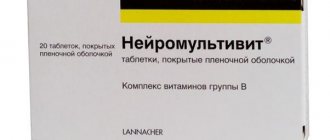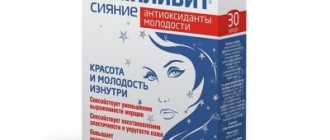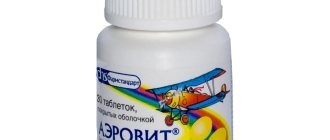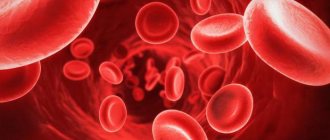pharmachologic effect
Cyanocobalamin is a biologically active drug that has hematopoietic, erythropotic, metabolic and antianemic effects. Accelerates tissue healing processes, normalizes the functioning of the central nervous system and the hematopoietic system, improves processes in the liver, enhances the activity of thromboplasts and prothrombin , activates the blood clotting process, reduces the amount of cholesterol in the blood.
special instructions
Before prescribing Cyanocobalamin, its deficiency must be established diagnostically, since it can mask a lack of folic acid.
During the therapy period, it is necessary to monitor peripheral blood parameters: on days 5–8 of the course, the level of reticulocytes and iron concentration should be determined. During the first month of treatment, 1–2 times a week, and subsequently 2–4 times a month, you need to monitor the number of red blood cells, hemoglobin level, and color index.
Remission is achieved when the number of red blood cells increases to 4–4.5 million/μl and they acquire normal diameter sizes, when anisocytosis and poikilocytosis are eliminated, as well as when the level of reticulocytes is normalized after the onset of reticulocyte crisis. Once hematological remission is achieved, peripheral blood parameters must be determined at least once every 4–6 months.
If there is angina pectoris and a tendency to form blood clots, Cyanocobalamin should be used in doses of up to 0.1 mg per administration.
It is recommended to use the drug for a long time against the background of pernicious anemia, as well as during operations on the gastrointestinal tract.
At the beginning of treatment for megaloblastic anemia, cases of arrhythmia secondary to hypokalemia have been reported, as a result of which it is necessary to monitor the potassium concentration during this period.
When using Cyanocobalamin in elderly patients, no adverse reactions other than those mentioned above were observed.
Most antibacterial drugs and antimetabolites can affect the results of determining the quantitative content of vitamin B12 using microbiological techniques.
Impact on the ability to drive vehicles and complex mechanisms
There is no information confirming the adverse effect of the drug on the ability to drive vehicles and operate complex machinery. However, given that Cyanocobalamin may cause dizziness, caution is required when performing these activities.
Pharmacodynamics and pharmacokinetics
Pharmacodynamics
Activates the metabolism of proteins, fats and carbohydrates . Forms an energy reserve in the body and actively participates in the process of transmitting nerve impulses. It is part of phosphocreatine and promotes the accumulation of hemoglobin in red blood cells . Stimulates bone marrow (normoblastic erythropoiesis). This drug normalizes liver function , has a positive effect on the blood coagulation system, and in high doses increases prothrombin .
Pharmacokinetics
The drug is absorbed primarily in the small (less in the large) intestine, then transported into the cell through the receptor system. In the blood it combines with transcobalamins I and II, and then is transported to tissues, where it is metabolized. In the body, this vitamin is deposited in the liver. It is excreted from the body by the renal excretory system.
Overdose
When taking tablets, an overdose is extremely rare: during absorption, part of the active substance is lost, and even if a single dose is exceeded, deterioration in well-being rarely occurs. Acute overdose occurs in young children, when the baby, mistaking beautiful capsules for candy, eats a large number of tablets. In case of overdose the following appears:
- pulmonary edema;
- vein thrombosis;
- acute heart failure;
- anaphylactic shock.
With injections, overdose occurs more often. This is due to the fact that with this method of administration, almost all vitamin elements are absorbed. When self-medicating due to incorrect dose selection and greatly exceeding the daily dose of the drug, signs of acute overdose appear.
There is no antidote for B12. If symptoms of drug poisoning appear, a person must be taken to a medical facility, where the doctor will select symptomatic therapy taking into account the disorders that have arisen. Without medical help, an overdose will negatively affect your health and, in severe cases, can result in death.
Indications for use of the drug
- iron deficiency anemia of various origins;
- folate deficiency and vitamin deficiency anemia ;
- cirrhosis of the liver;
- dystrophy in young children;
- motor neuron disease;
- lumbosacral radiculitis ;
- cerebral palsy in children;
- lesions of the trigeminal nerve;
- multiple sclerosis ;
- polyneuropathy;
- chronic hepatitis ;
- Down syndrome;
- neuralgia, neuritis;
- skin diseases ( psoriasis , eczema ).
Contraindications
Hypersensitivity to the components of the drug. Erythremia, erythrocytosis. Neoplasms, with the exception of cases that are accompanied by megaloblastic anemia and vitamin B12 deficiency. Acute thromboembolic diseases. Angina pectoris, high functional class tension.
Interaction with other drugs and other types of interactions.
Aminoglycosides, salicylates, antiepileptic drugs, colchicine, potassium preparations reduce the absorption of the drug and affect its kinetics. When used simultaneously with kanamycin, neomycin, polymyxins, tetracyclines, the absorption of cyanocobalamin is reduced. Pharmaceutically incompatible with ascorbic acid, heavy metal salts (inactivation of cyanocobalamin), thiamine bromide, pyridoxine, riboflavin (cobalt ion, which is contained in the cyanocobalamin molecule, destroys other vitamins).
When used simultaneously with thiamine, the risk of developing allergic reactions caused by thiamine increases.
Chloramphenicol reduces the hematopoietic response to the drug.
When used simultaneously with citamen, the effect of citamen is reduced.
Oral contraceptives reduce the concentration of cyanocobalamin in the blood.
Instructions for use of Cyanocobalamin (Method and dosage)
The drug is administered intramuscularly, intravenously, subcutaneously and intralumbarally . Therapy with Cyanocobalamin is accompanied by regular monitoring of coagulation parameters and the overall blood picture. The dosage of the drug depends on the specific disease:
- for aplastic anemia, 100 mcg is administered every other day until hematological and clinical improvement is obtained;
- for iron deficiency and posthemorrhagic anemia - 30-100 mcg three times a week;
- anemia in children - 40 mcg per day for 15 days;
- neurological traumatic diseases and diseases of the nervous system - in increasing doses from 250 to 500 mcg, duration of treatment - up to 2 weeks; if the patient's condition improves - 100 mcg per day;
- damage to peripheral nerves caused by trauma - 200–400 mcg every other day for one and a half months;
- Down's disease , cerebral palsy and dystrophies in children - 15–30 mcg per day;
- diabetic neuropathy, radiation sickness - 60-100 mcg for a whole month.
- hepatitis and cirrhosis of the liver - 100 mcg per day for 30 days;
- funicular myelosis , multiple sclerosis - 15–30 mcg of solution is administered, gradually increasing the dose from 200 to 500 mcg.
How to take pills
The daily dosage of vitamin B12 for an adult is 3 mcg. Most people get this amount with food, so there is no need to take dietary supplements. Vitamin supplements are needed when the body's need for vitamin increases or B12 absorption is impaired:
- Age over 50 years. As the body ages, the acidity of the gastric juice decreases and the absorption of the vitamin slows down. For older people, vitamin B12 is important: it helps prevent senile dementia and Alzheimer's disease. To compensate for the lack of substance you need to drink 2-5 mcg per day.
- Pregnant women. During pregnancy, the need for cyanocobalamin increases. A deficiency of the component provokes the development of birth defects in the fetus and can cause premature birth. You need to consume up to 4 mcg of vitamin per day under the supervision of a doctor. A similar dosage is prescribed when planning conception.
- Breast-feeding. During lactation, B12 enters the baby's body with milk. Vitamin deficiency in a nursing mother causes hypovitaminosis B12 in infants. Nursing women require cyanocobalamin 4 mcg.
- Diseases that impair absorption (Crohn's disease, diabetes, gastritis, enteritis). The maintenance dose can be up to 3 mcg.
- Anemia. The amount of vitamin B12 for anemia depends on the severity of the disease.
The daily dose of cyanocobalamin is divided into 2-6 doses. The pills are taken 30 minutes before meals. The duration of the treatment course depends on the indications for the use of cyanocobalamin. For prevention you need to drink for 2-3 weeks, and for treatment it will take a month, and sometimes more.
Most dietary supplements contain the daily dose in 1 capsule. The dietary supplement is taken once a day in the morning before meals.
Interaction
Cyanocobalamin is a vitamin that is incompatible with thiamine bromide, riboflavin and pyridoxine (in one syringe). When prescribed simultaneously with antibiotics ( kanamycin, polymyxins, neomycin and tetracyclines ), the absorption of this medicine becomes difficult. Do not take together with drugs that affect blood clotting. Therefore, if you have been prescribed Cyanocobalamin, the instructions for use should be carefully studied.
Alcohol compatibility
When drinking alcohol, cobalamins break down and vitamin deficiency is often detected in people who abuse alcohol. Alcohol and dietary supplements with B12 taken together do not harm, but ethyl alcohol destroys the vitamin and taking dietary supplements if you plan to drink alcohol is pointless.
The abstract for cyanocobalamin indicates that the medication is needed for the prevention or treatment of hypovitaminosis B12. If you follow the prescribed dose and rules of use, it is possible to eliminate vitamin deficiency. But taking dietary supplements is allowed only if vitamin deficiency is confirmed by blood tests. Self-medication often causes an overdose.
Analogs
Cyanocobalamin-Darnitsa, Cyanocobalamin - Vial, Cyanocobalamin Bufus, Medivitan.
Combination preparations containing vitamin B12
There are a number of combination drugs on the market - Cyanocobalamin tablets in combination with folic acid (Russia), Nowfoods B12, Solgar Vitamin B12 (USA), Neurobion (Germany), Neurovitan (Italy). As a rule, the release form is tablets.
Excess vitamin B12
When using large doses of cyanocobalamin, its toxicity was not detected. But in the presence of individual intolerance, excess vitamin B12 promotes mutation of DNA cells and increases the risk of developing heart failure and pulmonary edema. Other consequences include a predisposition to blood clots and prostate or lung cancer in men. Other signs of hypervitaminosis are urticaria, anaphylaxis.
Vitamin B12 in the body. Photo: yandex.ru
Reviews of Cyanocobalamin
Reviews about the drug are mostly positive. Patients note that after a course of treatment, hemoglobin increases, well-being is normalized and sleep improves, depression goes away, pain from neuralgia and inflammation of the trigeminal nerve decreases.
According to patient reviews, Cyanocobalamin in ampoules is an effective hair product. Many women are interested in how to use Cyanocobalamin for hair? Like all B vitamins, it has a positive effect on hair. Even regular (once a week) injections of the drug help strengthen hair roots and reduce hair loss. The drug is often used as a component of hair masks or in its pure form for rubbing into the hair roots.
Vitamin B12 deficiency
If an adult receives less than 3 mcg of cyanocobalamin per day, then we can talk about a lack of vitamin B12. It is noteworthy that deficiency often occurs due to the body’s inability to fully absorb it.
Vitamin B12 deficiency symptoms, the causes and treatment of which must be determined by a doctor, are caused by helminthiasis and the presence of foreign microbes in the ileum, where cyanocobalamin should be absorbed. It is poorly absorbed due to a lack of calcium, dysfunction of the stomach or pancreas, and an excess of ascorbic acid.
Causes of vitamin B12 deficiency. Photo: ortocure.ru
Symptoms of Vitamin B12 Deficiency
- poor appetite;
- nervousness;
- personality degradation;
- stool disorder;
- pallor and yellowing of the skin;
- backache;
- depression;
- redness of the tongue;
- muscle numbness;
- malaise;
- photosensitivity.
Lack of vitamin B12 - other symptoms in adults are ulcers on the corners of the mouth, increased fatigue, difficulty walking. Other signs are itching, burning, redness of the eyes or tachycardia, shortness of breath that occurs with minimal physical activity. Cyanocobalamin is found in animal products. Accordingly, deficiency of the substance is more often diagnosed in vegetarians.
A lack of vitamin B12 contributes to the development of pernicious anemia, the breakdown of amino acids, and intoxication. Deficiency provokes brain damage, causes schizophrenia, anemia, and chronic fatigue syndrome. A lack of substance leads to damage to mitochondria, which increases the likelihood of infection with deadly bacteria - fecal enterococcus, Pseudomonas aeruginosa.
Cyanocobalamin price, where to buy
You can buy the drug in all pharmacies. The price of Cyanocobalamin in Moscow pharmacies varies from 14.5 to 25.0 rubles per pack.
- Online pharmacies in RussiaRussia
- Online pharmacies in UkraineUkraine
- Online pharmacies in KazakhstanKazakhstan
ZdravCity
- Blagomin Vitamin B12 (cyanocobalamin) capsules 9 mcg 0.2 g 90 pcs. VIS LLC
200 rub. order
Pharmacy Dialogue
- Blagomin Vitamin B12 (cyanocobalamin) (caps. 200 mg No. 90) VIS LLC
RUB 212 order
- Vitamin B12 (cyanocobalamin) (amp. 500 µg/1 ml No. 10) DHF JSC
36 RUR order
- Vitamin B12 (cyanocobalamin) (amp. 500 µg/1 ml No. 10) BZMP
30 rub. order
show more
Pharmacy24
- Cyanocobalamin-Darnitsa 0.02% 1 ml No. 10 solution PrAT" Pharmaceutical company "Darnitsa", Ukraine
14 UAH. order - Cyanocobalamin 0.05% 1 ml No. 10 injection solution PAT "Galichfarm", Ukraine
12 UAH order
- Cyanocobalamin-Darnitsa 0.05% 1 ml No. 10 solution for injection PrAT" Pharmaceutical company "Darnitsa", Ukraine
17 UAH order
PaniPharmacy
- Cyanocobalamin solution for injection 0.05% ampoule 1 ml No. 10 Ukraine, Darnitsa ChAO
18 UAH order
- Cyanocobalamin solution for injection 0.02% ampoule 1 ml No. 10 Ukraine, Darnitsa ChAO
16 UAH order
- Cyanocobalamin solution for injection 0.05% ampoule 1 ml No. 10 Ukraine, Galichfarm JSC
14 UAH order
- Cyanocobalamin solution for injection 0.05% ampoule 1 ml No. 10 Ukraine, Lekhim-Kharkov JSC
16 UAH order
show more
Release forms
For treatment, tablets and injections are used. Injection solutions provide better absorption of B12 and are less likely to cause adverse reactions due to the lack of excipients. Injections are given intravenously, intramuscularly, under the skin or into the spinal cord. The injection form of the solution must be used in the following cases:
- the need to administer large doses of cyanocobalamin;
- inability of a person to swallow a tablet (newborns, patients with impaired swallowing function).
Vitamin B12 is the common name for the cobalamin group. Cyanocobalamin, adenosylcobalamin and hydroxocobalamin can be used as active ingredients in injection solutions.
All cobalamins are well absorbed, replenishing B12 deficiency. More often in medicine, injections of cyanocobalamin are used.
The inconvenience of administering solutions is that the injections must be given by a specially trained medic. It is prohibited to give injections at home. Improper administration of the solution causes an overdose.
Tablet drugs are absorbed a little worse (40-70% of the substance contained in the pill). Tablets or capsules are recommended to be taken when there is insufficient intake of the vitamin from food or when the body’s need for B12 increases (pregnancy, intense exercise, diseases accompanied by impaired absorption of cobalamins).
Vitamin B12 tablets and solutions are over-the-counter forms and are freely sold at pharmacies. But when prescribing the drug, it is better to ask your doctor for a prescription for cyanocobalamin in Latin:
Rp.: Solutio cyanocobalamini 20% – 0.1 ml*
DTD No. 10 in amp.
S. Intramuscularly, every other day. The course of treatment is 10 injections.
Several lines contain encrypted information that is important for the pharmacist. First there is an indication of the dosage of vitamin B12 and the form of release. Solutions of 20% (2 mcg) and 50% (5 mcg) are produced, so accurate knowledge of the therapeutic dose is important.
The second line states: in what quantity and in what quantity the medicine will be dispensed. In this case - 10 ampoules.
And the bottom section is a reminder for the patient. It says how to take vitamin B12.
For tablets, there will be a tab designation indicating the dosage for the pill, and then it will say how many doses will be needed and in what package.
Side effects
From the blood side:
hypercoagulability.
From the cardiovascular system:
tachycardia, pain in the heart area.
From the nervous system:
headache, dizziness, nervous agitation.
From the immune system:
allergic reactions, including skin manifestations (hyperemia, urticaria, rashes, itching, dermatitis), swelling, including Quincke's edema; breathing disorders, including asthma attack, anaphylactic shock, anaphylactoid reactions.
From the side of metabolism:
acne, bullous rash, nausea, sweating, impaired purine metabolism.
From the gastrointestinal tract:
loose stool.
General violations:
malaise, fever.
Local reactions:
hyperemia, itching, pain, swelling, induration and necrosis at the injection site.
Incompatibility.
When cyanocobalamin is used in the same solution with ascorbic acid and pyridoxine, mutual destruction of vitamins occurs, with nicotinic acid - destruction of cyanocobalamin, with riboflavin - accumulation of cobalt ions.










